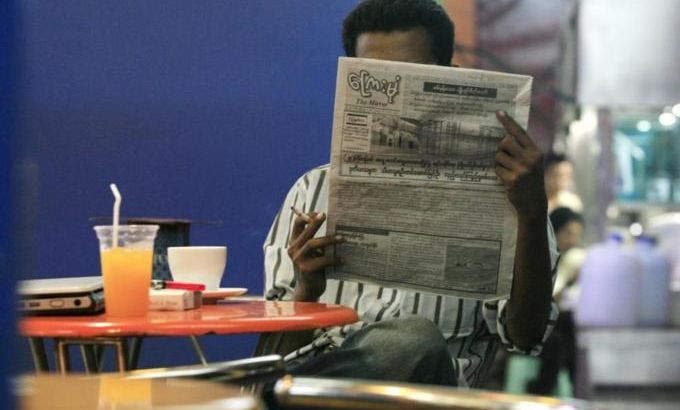Myanmar abolishes direct press censorship law
Journalists no longer have to submit work to state censors before publication, but self-censorship may remain an issue.

Myanmar has abolished the harsh practice of direct press censorship.
The government’s announcement on Monday marks a U-turn from the oppressive policies of the military that ran Myanmar for almost 50 years until March 2011.
The junta’s censors not only kept tight control over the media but monitored every song, cartoon, book and piece of art for subversive content.
Under the new rules, journalists will no longer have to submit their work to state censors before publication as they have for almost half a century.
Aung Zaw, a journalist in Myanmar, told Al Jazeera that he “cautiously welcomes this new move”.
“But the censorship board still remains… it hasn’t been abolished yet,” Zaw said.
Journalists are still prohibited from breaking any publishing laws – but violation of these laws will be determined by the board after the material has been published instead of before.
“They can still revoke any publication, if someone publishes any kind of sensitive materials it will create outrage in times of corruption,” Zaw said.
“I think restrictions and conditions are still there.”
Open to interpretation
Critics says some of the still-existing publishing laws are open to interpretation and give the government enormous power to go after its critics. They have been used repeatedly in recent years to jail members of the press who have published material deemed a threat to national security.
The Southeast Asian nation’s reporters had long been regarded as among the most restricted in the world.
However, President Thein Sin’s reformist government has significantly relaxed media controls over the last year, allowing reporters to print material that would have been unthinkable during the era of absolute military rule – like photographs of opposition leader Aung San Suu Kyi.
The information ministry, which has long controlled what can be printed, made the announcement on its website Monday. The head of the ministry’s Press Scrutiny and Registration Department, Tint Swe, also conveyed the news to a group of editors in the country’s main city Yangon.
Decision welcomed
Journalists welcomed the lifting of restrictions but some were worried their reports could still fall foul of various laws on the statute book.
“It’s a big improvement on the past. I do welcome it but there will be more responsibilities on the editors since there are some existing laws under which action can be taken against journalists for their writing,” Wai Phyo, chief editor of the Weekly Eleven journal, said.
These laws, in place since a military coup in 1962, include edicts prohibiting journalists from writing articles that could threaten peace and stability, oppose the constitution or insult ethnic groups.
It was not immediately clear to what degree continued government scrutiny could lead to self-censorship. Some topics remain highly sensitive, like corruption and alleged abuses committed by army officers during the previous ruling junta.
“There are still regulations imposed on the journalists and editors and publications. I assume that like in the past, journalists and editors will have to practice self-censorship,” Zaw told Al Jazeera.
Overzealous authorities could use the threat of prosecution to prevent articles from being published or exact harsh punishments for material they do not like.